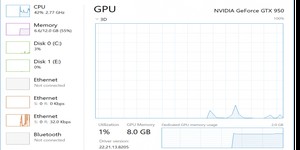Windows Store games to force graphics driver updates
December 14, 2016 | 10:37
Companies: #amd #microsoft #nvidia

Microsoft has announced that is to begin forcibly upgrading users' graphics card drivers to recommended minimum versions when games and other graphics-driven applications are installed from the Windows Store, starting from the upcoming Windows 10 Creators Update.
Microsoft's Windows Store, a closed-garden ecosystem based on rival platforms including Apple's App Store and Canonical's earlier Ubuntu Software Centre, is designed with two goals in mind: to make it easier and safer for users to install third-party software on Windows, and to give Microsoft control over exactly what software is offered - and, of course, a cut of any revenue generated as a result. For gamers, though, the Windows Store has not been an unalloyed success: In November it was discovered that installing the Windows Store version of Call of Duty: Infinite Warfare prevented you from playing with non-Windows Store gamers, and with the majority choosing to buy the game at retail or via Steam that meant extremely empty multiplayer lobbies.
Now, Thurrot has noted a detail hidden away in a presentation from last week's WinHEC event that may give gamers even more cause to avoid the Windows Store: Microsoft is to start bundling graphics card driver updates, enforcing minimum driver versions before a game can be installed.
On the surface, the idea makes sense: Each major AAA release is usually accompanied by drivers from both AMD and Nvidia which are designed to optimise performance, giving a smoother experience than using older unoptimised drivers. In practice, though, installing the most cutting-edge version of a graphics card driver can be fraught with difficulties ranging from bugs that crash you to the desktop to poorer performance in older games - or even the loss of particular 'legacy' features altogether. As a result, it's no surprise to find that most savvy PC gamers like to keep their drivers under manual control, rolling back to older versions when problems are encountered and letting others act as free beta testers before installing new releases.
Under the Windows 10 Creators Update, though, this will no longer be an option. In its presentation, Microsoft explained that installing a game via the Windows Store will automatically trigger an update to the recommended driver version or better for said game via Windows Update. While it should be possible to roll back to earlier releases if this unprompted update is undesirable, Microsoft hasn't yet indicated whether the update is triggered only when a game is installed or each time a Windows Store game is executed - nor if there will be an opt-out for those who prefer to exert manual control over driver upgrades.
The Windows 10 Creators Update is due to launch early next year.
Microsoft's Windows Store, a closed-garden ecosystem based on rival platforms including Apple's App Store and Canonical's earlier Ubuntu Software Centre, is designed with two goals in mind: to make it easier and safer for users to install third-party software on Windows, and to give Microsoft control over exactly what software is offered - and, of course, a cut of any revenue generated as a result. For gamers, though, the Windows Store has not been an unalloyed success: In November it was discovered that installing the Windows Store version of Call of Duty: Infinite Warfare prevented you from playing with non-Windows Store gamers, and with the majority choosing to buy the game at retail or via Steam that meant extremely empty multiplayer lobbies.
Now, Thurrot has noted a detail hidden away in a presentation from last week's WinHEC event that may give gamers even more cause to avoid the Windows Store: Microsoft is to start bundling graphics card driver updates, enforcing minimum driver versions before a game can be installed.
On the surface, the idea makes sense: Each major AAA release is usually accompanied by drivers from both AMD and Nvidia which are designed to optimise performance, giving a smoother experience than using older unoptimised drivers. In practice, though, installing the most cutting-edge version of a graphics card driver can be fraught with difficulties ranging from bugs that crash you to the desktop to poorer performance in older games - or even the loss of particular 'legacy' features altogether. As a result, it's no surprise to find that most savvy PC gamers like to keep their drivers under manual control, rolling back to older versions when problems are encountered and letting others act as free beta testers before installing new releases.
Under the Windows 10 Creators Update, though, this will no longer be an option. In its presentation, Microsoft explained that installing a game via the Windows Store will automatically trigger an update to the recommended driver version or better for said game via Windows Update. While it should be possible to roll back to earlier releases if this unprompted update is undesirable, Microsoft hasn't yet indicated whether the update is triggered only when a game is installed or each time a Windows Store game is executed - nor if there will be an opt-out for those who prefer to exert manual control over driver upgrades.
The Windows 10 Creators Update is due to launch early next year.

MSI MPG Velox 100R Chassis Review
October 14 2021 | 15:04









Want to comment? Please log in.